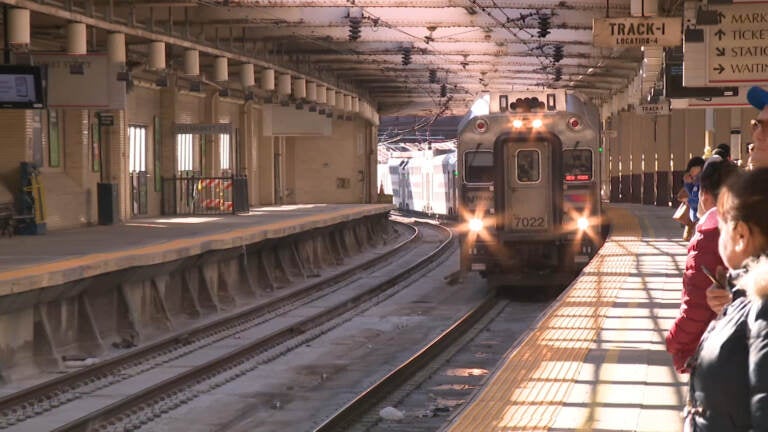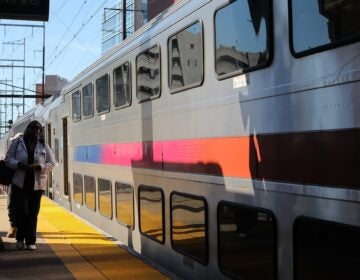How NJ Transit dodged those record high fuel costs
A financial hedge saves millions as most brace while filling the tank.

(NJ Spotlight)
This story originally appeared on NJ Spotlight.
Gas prices hit record highs in New Jersey this month, but not for New Jersey Transit, the statewide mass-transit agency and a major fuel consumer.
Instead of facing the same pain and uncertainty that many motorists have when filling their tanks, NJ Transit has been saving millions of dollars thanks to a proactive move to essentially lock in much lower prices.
“We hedged our diesel prices for our fleet, so for this year, we’re in good shape,” NJ Transit executive director Kevin Corbett told members of the Assembly Budget Committee during a recent hearing in Trenton.
Corbett faced questions from lawmakers about how rising fuel prices may be affecting NJ Transit’s finances as they prepare to draft a state budget for the fiscal year that begins July 1.
Without a dedicated source of state revenue, NJ Transit instead relies heavily on rider fares and subsidies that come out of the state budget each year. That tenuous funding arrangement makes factors such as rising fuel prices a key concern for lawmakers who are tasked with writing the state’s annual appropriations bill.
“We just want to make sure, obviously, if there continues to be an uptick, that your agency is prepared — with money,” Assembly Budget Committee Chair Eliana Pintor Marin (D-Essex) told Corbett during the recent hearing.
Lower price locked in
The cost of a gallon of regular unleaded gas hit an all-time high of $4.77 in New Jersey on May 20, according to price tracking conducted by AAA. And for diesel — an important fuel for mass-transit agencies — the per-gallon cost in New Jersey also reached a record high this month, soaring to $6.33 on May 18, according to AAA.
In all, diesel prices have increased in New Jersey by more than $3 per gallon since this time last year, according to AAA’s data.
But NJ Transit officials told lawmakers during a budget hearing earlier this month that the agency has locked in much lower prices for its own fuel purchases. That’s left NJ Transit “substantially in the money” due to the fuel hedging, officials said during the hearing.
“Right now, budget-wise, we are (prepared), particularly with our hedge on diesel,” Corbett told Pintor Marin.
As a general practice, NJ Transit, which operates both trains and buses, competitively bids what are known as fuel “swaps” with financial institutions, agency spokesman Jim Smith told NJ Spotlight News. These arrangements enable the agency to establish some cost certainty for the fuel portion of its overall operating budget, he said.
“NJ Transit looks for fuel hedge opportunities approximately 12-18 months in advance to lock-in a per-gallon average budgeted fuel price for the fiscal year,” Smith said.
In addition to providing cost certainty, the swaps right now appear to be generating some hefty benefits due to the rise in prices. In all, the fuel hedging had netted NJ Transit an estimated $26 million through the first nine months of the July-to-June fiscal year, Smith said, and overall fuel spending is also running under budget to date.
“In 2020 and 2021, in the height of the pandemic, when forward prices were very attractive, NJT acquired hedge positions for fiscal year 2022, which provided us with a competitive average budget price per gallon,” Smith said.
Long-term financial problems
“Fiscal year-to-date, 2022 market or ‘spot’ prices are much higher than the hedged price, resulting in substantial fuel hedge gains and below budget fuel costs,” he said.
To be sure, the savings that NJ Transit has realized from fuel hedging represent only a small percentage of its overall $2.65 billion annual operating budget. And while the hedging has helped to insulate the agency from the rising fuel prices in the near term, NJ Transit’s finances remain a key concern amid the ongoing COVID-19 pandemic, which has affected ridership since 2020.
This year, Gov. Phil Murphy has earmarked another $100 million for NJ Transit’s subsidy in the nearly $49 billion state budget he proposed several weeks ago.
Meanwhile, Murphy’s budget — which assumes no increase in rider fares — also helps balance NJ Transit’s operating budget by using funds transferred from the New Jersey Turnpike Authority and the state’s Clean Energy Fund. A long-standing transfer of a portion of the agency’s capital resources to support the operating budget would also continue under Murphy’s plan.
Budget documents indicate NJ Transit is also facing a “fiscal cliff” once significant federal pandemic relief dollars that the agency received during the health crisis are used up. For the current fiscal year, NJ Transit is utilizing nearly $1 billion in federal aid to help offset revenue losses caused by the pandemic, according to the budget documents.
It’s now up to state lawmakers to draft a detailed spending bill for the 2023 fiscal year and send it to Murphy by the July 1 deadline.
During the recent budget hearing, NJ Transit’s broader fiscal outlook was also a key concern raised by lawmakers. But Corbett indicated the federal funds will last for several more years and the agency is also projecting ridership to continue to rebound as the health crisis wanes.
Meanwhile, Smith said NJ Transit already has fuel-hedge positions in place for the 2023 fiscal year.
“If market fuel prices remain higher than our average hedged price, we will realize gains from the hedges and costs will fall within budget,” he said.

Get daily updates from WHYY News!
WHYY is your source for fact-based, in-depth journalism and information. As a nonprofit organization, we rely on financial support from readers like you. Please give today.






